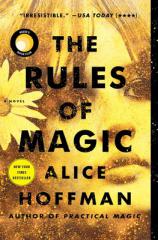Author Talk: October 12, 2017
Alice Hoffman is the prolific author of more than 30 works of fiction, including THE MARRIAGE OF OPPOSITES, THE MUSEUM OF EXTRAORDINARY THINGS and THE DOVEKEEPERS. Her latest novel, THE RULES OF MAGIC, is a prequel to her 1995 bestseller, PRACTICAL MAGIC, which takes us inside the lives of Frances and Jet Owens before their nieces, Sally and Gillian, came along. In this interview, Hoffman explains what inspired her to return to the Owens family after 22 years, the appearance of a male character in a lineage that has always been composed of female witches, how she chose the book’s setting, and the most important lesson she hopes will resonate with readers long after they’ve turned the last page.
Question: What inspired you to return to the Owens family? Why did you decide to write a prequel rather than a sequel?
Alice Hoffman: I had always loved the Owens family, and I felt there was so much more to write about them. But rather than go forward in time, I was more interested in the family's past. Who were the aunts we meet in PRACTICAL MAGIC when they were young? And how did the family's past affect the next generation? These were the questions I started with, and Jet and Frances filled in the rest.
Q: In the original novel, PRACTICAL MAGIC, the Owens sisters were opposites of each other, even described as different as night and day. Many readers saw themselves as either Sally or Gillian. Do you think this will happen again with these new characters? Who reminds you of yourself?
AH: Like Sally and Gillian, Frances and Jet appear to be very different. One is daring and is the first to drink Courage Tea; the other is more retiring, sweeter and kinder. But when it comes down to it, in times of trouble, they are very much the same, putting those they love first. I always think that every character I write is nothing like me, yet contains a spark that is similar. Often, I write about people I wish I could be more like, and when it comes to the Owens family I certainly admire their strength when it comes to facing fate, and being brave enough to try to change it.
Q: The Owens lineage has always been composed of female witches. How did the character Vincent come to you? Additionally, what motivated you to write a gay character?
AH: I didn’t know Vincent was gay until he knew --- which is to say, he was repressing that self-knowledge so well even I didn't see it at first. For me, a character arrives fully formed --- they are who they are --- and this happened with Vincent. It was certainly interesting that he kept a secret, even from me, until he was ready to be who he was in a time when that was not terribly easy to do.
Q: Readers love the magical tone you weave into your novels. Your writing certainly does bring the reader into a world of storytelling and enchantment where it seems that anything is possible. How did you develop this style? Do you have any advice for aspiring writers who are trying to find their own voices?
AH: A writer's voice is like a fingerprint. No one else can have your voice --- it is unique. But one way to get there is to read other writers whose work you love; their influence can help you find your own voice. And, of course, the more you write, the more you understand your own voice.
For me, enchantment and reading always went together, from the stories my Russian grandmother told me to the fairy tales I read. My own writing was influenced by these stories, and it seemed natural for magic to be a part of my fiction.
Q: Vincent’s song, “I Walk at Night,” enthralls the crowd at the Monterey Pop Festival in 1967. It’s a beautiful song that provides a few key insights into the themes and fates of your characters. Had you written song lyrics or poetry before? Were you influenced by any particular musicians or poets?
AH: I’d written a poem for THE RED GARDEN, which seemed like the heart of the book, and I’ve always been influenced by Bob Dylan and Leonard Cohen, great songwriters and great poets. Listening to them was very helpful, and Leonard Cohen allowed me to use a quote of his in my last book, FAITHFUL, which meant a great deal to me. My friend, the poet Sue Standing, was my first “poetry reader,” and that was helpful as well.
Q: Speaking of the Monterey Pop Festival, THE RULES OF MAGICtakes place during the 1960s and ’70s. How did you choose the setting, and what was your research process? Further, with such a chaotic and turbulent time period, how did you decide which historical events to include?
AH: I think of the ’60s and ’70s as my time period. It was when I began listening to Dylan and going to Greenwich Village, and I lived for a while in Northern California. It was such a chaotic time, with so much violence. Our country was divided, and it was nearly impossible to talk to someone “on the other side.” At the same time, people were fighting for their rights, and they came together in an amazing way. So much happened that I couldn't refer to most of the historical events --- if I had, there would have been no room left over to write about the Owens family. I wrote about what personally affected my characters, and focused on the personal and political aspects of the time that affected Vincent.
Q: Vincent’s dog, Harry, often acts as his accomplice. Lewis guards Franny’s heart. Wren lifts Jet out from her depression. Animals often play a supportive, intuitive role in your books. Have you had many pets? Any you would consider your familiar?
AH: I love the idea that witches have familiars, animals they are so close to that they understand each other completely. Yes, my great German shepherd, Houdini, was my familiar. I miss him every day.
Q: Maria Owens’ curse is a burden that characters from both PRACTICAL MAGICand THE RULES OF MAGICattempt to overcome. The two strategies that arise are to beware of love or to love more. What about the dichotomy interests you? What makes it such an intriguing and relatable struggle?
AH: I think this is a curse that is likely a burden for everyone, not just the Owens family. Love is a burden, it’s dangerous, it can break your heart, but in the end there is little point to a life without it. It may ruin you, you may lose everyone, but that is the price we pay to be human. It is an ongoing struggle, and I think as you grow up, as the Owens family does, you see the risks in a different way. You have courage.
Q: There are many pieces of advice given and lessons learned in this novel. Which one do you hope continues to resonate with readers long after they’ve placed THE RULES OF MAGICback on the shelf?
AH: I think the most important lesson for Jet and Franny and Vincent is how important it is to be true to oneself, to accept oneself --- including the flaws --- and appreciate one’s own uniqueness. You are not like anyone else. And that’s a good thing. And, of course, despite pain and heartbreak, the most important lesson is always to love more.
Q: Any news on what we can expect from you next?
AH: I’m researching a historical novel set in France, and, of course, I am always interested in the Owens family.




